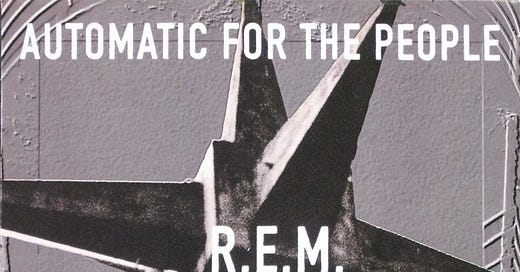R.E.M. — Automatic for the People — 1992
11.January.2021
R.E.M.
Automatic for the People
1992
It’s hard to encapsulate just how important R.E.M. is to modern rock and roll. So I won’t try.
Now, you may think that sounds hyperbolic, but ask any member of Generation X, and they’ll have a R.E.M. story.
For a period of about 8 years, R.E.M. didn’t capture the zeitgeist.
They were the zeitgeist.
After the astounding success of the previous years Out of Time, R.E.M. found themselves in a unique (and much sought after) position for any band — they could do whatever the hell they wanted.
So they did. They again told their label that they would create the album they wanted and were not going to tour behind it. This no doubt caused a fair amount of grumbling, but Warner Brothers Records acquiesced.
Released just weeks before the 1992 generation-defining presidential election, Automatic for the People would prove to be the crown jewel in R.E.M.’s cannon. The album produced six singles out of twelve songs, provided the title for an Academy Award-nominated film (Man on the Moon), and has sold over 18 million copies worldwide.
Most critics agree it’s their best album. So do guitarist Peter Buck and bassist Mike Mills who regard Automatic for the People as “the finest album the band ever recorded.”
The band, Michael Stipe (vocals), Peter Buck (guitar), Mike Mills (bass), and Bill Berry (drums), decamped from Athens, Georgia, in March of 1992. They headed north to join Out of Time producer Scott Litt at the classic Bearsville Studios in Woodstock, New York.
Even fans were a bit flummoxed by the first single, “Drive.” Not only was it musically and lyrically esoteric, even by R.E.M. standards, but the video (videos were de rigueur in 1992) was equally odd.
It would be the second single, “Man on the Moon,” that ignited the fire that helped Automatic for the People reach critical mass.
While there is a lot packed into this song, the main theme is a nod to comedian Andy Kaufman's genius, who had died eight years prior. A debate has always been had about whether Kaufman was a comedian or performance artist, a debate Kaufman propagated and relished in.
In NME In 2017, British music magazine NME published an interview with bassist Mike Mills, who said that Andy Kaufman was the perfect person to lead you on a tour of questioning things like his death, the death of Elvis Presley, the moon landing, etc.:
“He’s the perfect ghost to lead you through this tour of questioning things. Did the moon landing really happen? Is Elvis really dead? He was kind of an ephemeral figure at that point so he was the perfect guy to tie all this stuff together as you journey through childhood and touchstones of life.”
Man on the Moon
Now, Andy, did you hear about this one?
Tell me, are you locked in the punch?
Andy, are you goofing on Elvis?
Hey baby, are we losing touch?
If you believed they put a man on the moon
Man on the moon
If you believe there’s nothing up his sleeve
Then nothing is cool
Moses went walking with the staff of wood
Yeah, yeah, yeah, yeah
Newton got beaned by the apple good
Yeah, yeah, yeah, yeah
Egypt was troubled by the horrible asp
Yeah, yeah, yeah, yeah
Mister Charles Darwin had the gall to ask
Yeah, yeah, yeah, yeah
Now Andy, did you hear about this one?
Tell me, are you locked in the punch?
And Andy are you goofing on Elvis?
Hey baby, are you having fun?
Automatic for the People included four songs, “Drive”, “The Sidewinder Sleeps Tonite”, “Everybody Hurts” and “Nightswimming," with string arrangements by Led Zeppelin bassist John Paul Jones.
This partnership may help describe how R.E.M. managed to bridge the gap between arty rock music and the testosterone-fueled Grunge music that was stampeding all around the world in 1992, just as Led Zeppelin had done 20 years prior.
There was barely a bad word said about the album in 1992. And now, even close to 30 years later, the same can be said.
Automatic for the People ranks among maybe only a dozen of flawless rock albums. Even better, while it may be of Generation X, the album, like any flawless music, transcends generations.





